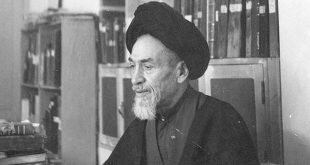
The Britishers occupied Al-Faw, Southern Iraq, in 1953 and then decided to proceed. Hence, Iraqi Shia clergies issued a fatwa on Jihad against the British forces to dislodge them from the country, and accordingly, tens of thousands volunteers rushed into the anti-Britain fronts led by three groups of clergies. Seyed Mohsen Hakim was in the third group, led by his favored teacher Seyed Muhammad Saeid Haboubi who spent many years in war against the occupiers. Ayatollah al-Hakim had said about that era, “I never once felt frightened during war.” He strenuously took part in assisting Islamic Liberation movements and encouraged Muslims to support Palestinian Muslim brothers. He issued multiple significant declarations on the issue of Palestine and the need for unity among Muslims to liberate Beit-ul-Moqaddas, and so suffered many difficulties in this way. Subsequent to 6-day Arab-Israeli War, he demanded Muslim leaders to put their differences aside and consider the interests of Islamic Ummah. He also emphasized once again on the necessity of Islamic unity to confront the world Zionism. Ayatollah Hakim was also mindful of Iran’s developments and didn’t remain silent in the face of the Imperial Regime and its anti-Islamic rules. In political struggles between the Shah and clergies, began from 1962, he released a message to take sides with Iranian clergies led by Imam Khomeini. Spurning “State and Provincial Associations Bill” as blasphemous and also condemning attack on Feiziyeh School, he called on clergies to flight to Iraq Holy Shrines together, but it was rejected. He also sent a harsh telegraph to condemn the bloody suppression of the Uprising of 5 June 1963. He never restricted himself within Iraqi borders, but backed any oppressed in any part of the world, even non-Muslims, upon hearing their calls.As the socialist Ba’ath Party went about creating an autocratic state in Iraq, Ayatollah Mohsin al-Hakim’s own sons Sayyid Muhammad Mahdi al-Hakim and Sayyid Baqir al-Hakim established the Islamic Da’wa Party along with Martyr Sayyid Muhammad Baqir al-Sadr and Sayyid Murtadha al-Askari. The Party sought to counter the Ba’ath regime’s autocratic and un-Islamic practices, and as a result, many of its members were brutally killed.
Like Ayatollah Burujardi, Ayatollah Mohsin al-Hakim (and later, Ayatollah Abul Qasim al-Khoei) is accused of maintaining a “quietist” attitude during this period. However, one must remember that his religious leadership occurred during some very turbulent times. Revolutions do not take place overnight, and Ayatollah Mohsin al-Hakim recognized that in order to effectively counter the Ba’ath Party in the long run, there must be a dedicated group of scholars and jurists to lead the masses. Therefore, he let Sayyid Muhammad Baqir al-Sadr be in charge of the resistance movement, whereas he himself concentrating on producing the next great crop of Shia academia. Indeed, many of his students and at least six of his sons were brutally persecuted and subsequently killed by the Ba’ath regime. Today, the influential Supreme Islamic Iraqi Council (SIIC) is led by Sayyid Abdul Aziz al-Hakim, one of Ayatollah Mohsin al-Hakim’s sons.
He also established several new religious schools, including the Madressa Sharif al-Ulema in Karbala, Madressas Sayyid Yazdi, Dar al-Hikma, and Ilmiya in Najaf, Madressa Ilmiya in Hilla, as well as a religious school especially for students of Afghan and Central Asian origin. His list of students includes such great names as Sayyid Abul Qasim al-Khoei, Sayyid Ruhollah Musawi Khomeini, Martyr Sayyid Qadhi Tabatabai, Martyr Sayyid Muhammad Baqir as-Sadr, Sayyid Ali Hussaini Sistani, Sayyid Sa’eed Tabatabai Hakim (his grandson), Shaikh Hussain Waheed Khurasani, and Shaikh Nasir Makarem Shirazi.
During his time, the seminary increased its international outreach efforts, and Ayatollah Mohsin al-Hakim used the seminary’s financial resources to establish mosques, Hussainiyas, and Islamic cultural centers all over Iraq, as well as in places like Lebanon, Syria, Afghanistan, and Pakistan. His code of practice and hundreds of Islamic books was published in local languages such as Urdu and Pashto and made easily accessible to the masses in these places for the first time.
 Ijtihad Network Being Wise and Faithful Muslim in the Contemporary World
Ijtihad Network Being Wise and Faithful Muslim in the Contemporary World
